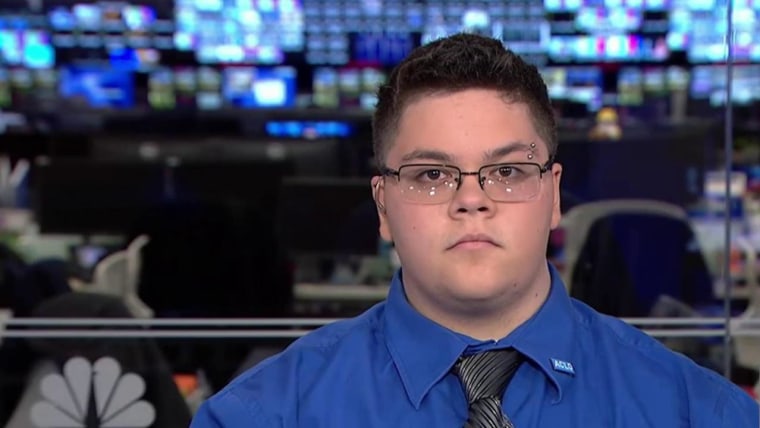Supreme Court won’t hear dispute over bathrooms for transgender students
The Supreme Court on Monday declined to take up the issue of whether the nation’s schools must allow students to use the bathroom that match their gender identities.
The court declined, without comment, to hear the case of Gavin Grimm, who has been at the center of a long legal battle with the school board in Gloucester County, Virginia. Grimm was born female but identified as male after his freshman year in high school, legally changing his name and beginning hormone therapy.
The principal at first gave him permission to use the boys’ bathroom, but the school board later adopted a policy saying restrooms were “limited to the corresponding biological genders.”
“For school officials, as for parents, the question how best to respond to a teenager who identifies with the opposite biological sex is often excruciatingly difficult,” lawyers for the school district told the Supreme Court. But the privacy rights of millions of students are at risk if their transgender classmates are allowed to use bathrooms matching their gender identities, they said.

Transgender teen at heart of SCOTUS case on Trump rollbacks
Lawyers from the American Civil Liberties Union, representing Grimm, told the court that treating him differently by requiring him to use separate single-stall bathrooms singled him out “and stigmatized him as unfit to use the same restroom as his peers.”
They said there was no need for the Supreme Court to take up the appeal, because the lower courts that have considered the issue reached the same conclusion — that treating transgender students differently violates a federal law, known as Title IX, that bans sex discrimination in school programs.
Monday’s order denying review in the case means Grimm’s victory in the appeals court remains intact.
The American Civil Liberties Union celebrated the action.
“This is an incredible victory for Gavin and for transgender students around the country,” said Josh Block, a senior staff attorney.
Grimm said he is glad the legal fight is over.
“Being forced to use the nurse’s room, a private bathroom, and the girl’s room was humiliating for me, and having to go to out-of-the-way bathrooms severely interfered with my education,” he said. “Trans youth deserve to use the bathroom in peace without being humiliated and stigmatized by their own school boards and elected officials.”
Justices Clarence Thomas and Samuel Alito said the Supreme Court should have taken the case.
Related issues may soon be headed to the Supreme Court, including disputes over allowing transgender students to play on the school sports teams matching their gender identities.
Grimm originally went to court in 2015, arguing that the school board’s policy made him feel ashamed and isolated, and the 4th U.S. Circuit Court of Appeals, based in Richmond, ruled in his favor. It said refusing to let students use bathrooms corresponding to their gender identity would violate the federal law.
That ruling cited an Obama-era Education Department letter that said “a school generally must treat transgender students consistent with their gender identity.” The appeals court found that to be a reasonable interpretation of Title IX, and the school district appealed to the Supreme Court.
But when the Trump administration rescinded the Education Department letter in 2017, the justices said they would not hear the case and vacated the appeals court ruling. So Grimm refiled his lawsuit and won again in the lower courts, leading to this current appeal to the Supreme Court.
Two things have changed since the first time the case came before the justices. The Supreme Court ruled last year that a federal civil rights law bans employment discrimination on the basis of gender identity, and now the Biden administration has interpreted that ruling as applying to Title IX as well.
“A school’s policy or actions that treat gay, lesbian, or transgender students differently from other students may cause harm,” a legal memo from the Department of Education said.